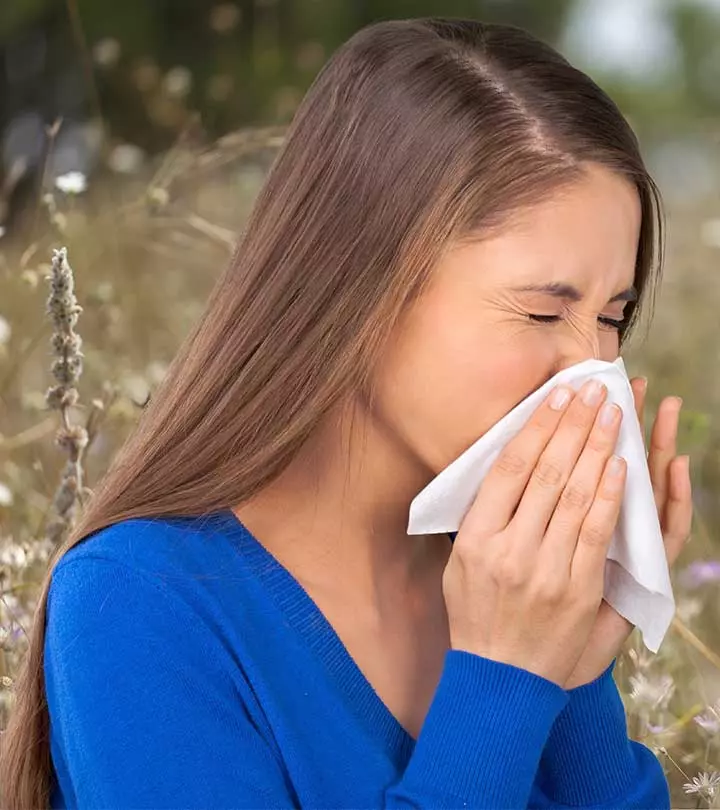8 Most Effective Home Remedies For Cold During Pregnancy
Deal with your stuffy nose and congested airways with simple, effective natural solutions.

Image: iStock
Home remedies for cold during pregnancy can help you manage most of the annoying symptoms that kick in with flu and cold. Natural remedies are handy when you can no longer reach for the most convenient over-the-counter drugs of your choice. Though not harmful to the baby, a pregnancy cold can be pretty uncomfortable when it is combined with the regular fare of hormonal and physical changes. It is often said that pregnant women are more susceptible to cold and flu. Read on to understand why that is, what the common symptoms of cold are, and what home remedies and medications you can use to tackle cold symptoms.
In This Article
Understanding Cold And Its Symptoms
The common cold is a contagious, upper respiratory tract infection caused by certain viruses that do not leave long-lasting immunity (1). As a result, people may get infected by those viruses repeatedly. According to the American Lung Association, colds lead to more doctor visits in the United States than any other health condition (2).
There are over 200 different kinds of viruses that may cause a cold, including the following:
- Human rhinoviruses
- Coronaviruses
- Human parainfluenza virus (HPV)
- Respiratory syncytial virus (RSV)
- Adenovirus
Symptoms of the common cold may include the following (1):
- Scratchy or sore throat
- Nasal congestion
- Runny nose
- Sneezing
- Cough
- Tiredness
- Mild fever that is lower than 100℉
On average, adults catch a cold twice or thrice a year and children even more frequently (2). Cold is also common in pregnancy. Let us understand why.
Why Do You Catch A Cold During Pregnancy?
You are more prone to catch a cold during pregnancy as your immune system is suppressed. When you are pregnant, your body’s natural immune system cannot distinguish a growing fetus from a virus or any other foreign entity and may target the fetus through antibodies. So that the fetus is safe against such an attack, the immune system lowers its defense mechanism and prevents that from happening (3).
However, though this immunosuppressioni Reduced efficacy of the immune system’s natural ability to fight infections and diseases that can lead to major health concerns. protects the fetus from attack from within, it leaves you more susceptible to viral infections such as the cold and the flu. And while the virus cannot reach the womb, you may feel all the symptoms and discomfort associated with a cold. So let’s see how you can get some relief and improve your pregnancy health with simple and safe remedies for cold during pregnancy.
8 Most Effective Home Remedies For Cold During Pregnancy
1. Hydration
Staying hydrated is important in pregnancy and even more important if you have a cold during this period. Hydration may help to thin out mucus and reduce congestion. In addition, a study showed that drinking warm liquids may bring relief from runny nose, sore throat, chilliness, fatigue, sneezing, and cough. By contrast, drinks at room temperature can provide relief only from a runny nose, cough, and sneezing (4). You can stay adequately hydrated and get relief from a stuffy nose by drinking 8-12 cups of lukewarm/ hot water and other warm beverages.
2. Immune-boosting Micronutrients
Micronutrients like vitamin C, vitamin A, vitamin D, vitamin E, iron, selenium, and zinc provide you with antioxidants and a boost to the immune system that may help with your recovery. For instance, research suggests vitamin C, vitamin D, and zinc are most effective at shortening the duration of a cold and reducing the severity of its symptoms (5). You can opt for a prenatal vitamin that includes all the essential micronutrients after consulting your ob-gyn. You can also get them by eating nutrient-rich foods like carrots, bell peppers, pumpkin seeds, strawberries, mangoes, collard greens, cantaloupes, Brussel sprouts, and asparagus.
3. Chicken Soup
Chicken soup has been traditionally used as a popular home remedy to treat cold. In one study, it has been found that chicken soup inhibits certain immune responses, which helps minimize the symptoms of the common cold (6). Another study that compared the effects of hot fluids on cold symptoms found that hot chicken soup was the most effective at relieving nasal congestion (7).
Jennifer, a blogger, posted that one of the remedies she has tried for her cold during pregnancy was consuming chicken broth. She writes, “Take lots of chicken broth, using as much of the original stock as possible. Apparently there’s some truth to that ‘chicken soup for the soul’ thing, not to mention how soothing it can be on a sore throat. I’ve been blessed with a lot of chicken bones lately and have been boiling up some broth for breakfasts the past few days. That, with a little bit of avocado, garlic, and celery thrown in for good measure – mmm (i)!”
 Quick Tip
Quick Tip4. Pineapple Juice
Bromelain, an active ingredient present in pineapple, has been shown to have strong anti-inflammatory and mucolytici A drug or agent that helps reduce the thickness and stickiness of mucus, making it easier to breathe by clearing the airways. action (8). This means that it may help to relieve a sore throat and congestion in the airway. The traditional pineapple juice cough recipe includes a few other ingredients like salt, pepper, and honey. To make it, add a pinch of salt and black pepper to a cup of pineapple juice and stir in one tablespoon of honey.
5. Ginger
With active compounds like gingerols and shogaols, ginger is a powerful anti-inflammatory, antiviral, antibacterial, and antioxidant ingredient (9). While more studies are needed to establish how ginger relieves cold symptoms, it is widely used in traditional medicine as a cough and cold remedy (10). You can chew on a piece of ginger with a sprinkle of salt or a drizzle of honey. You may also make ginger tea by boiling sliced or grated ginger with a cup of water.
 Quick Tip
Quick Tip6. Turmeric
Turmeric, like ginger, has been used traditionally for cough, cold, and inflammation. It is one of the best herbal remedies for health and wellness. Curcumin, a potent antiviral, anti-inflammatory, and antioxidant, is the main active ingredient in turmeric that may help boost your immune system (11). A stronger immune function can help fight off the infection, whereas its anti-inflammatory effect can soothe an irritated throat as well as reduce nasal congestion.
You can add a teaspoon of turmeric powder and a pinch of black pepper to a warm glass of milk for a soothing drink. Alternatively, make a turmeric salt-water gargle using a warm glass of water and half a teaspoon each of salt and turmeric powder.
7. Rest
Research has established that poor sleep negatively impacts the immune system and makes one more susceptible to infections, including upper respiratory tract infections. Adequate rest, i.e., between 7 and 9 hours of sleep, may help to boost immunity and fight off an existing infection (12). Elevate your head with one or two pillows to help make sleeping with a cold easier. If you find yourself waking up more frequently through the night, try to go to bed early to get more hours of sleep. Getting enough rest itself can solve several health issues and improve your holistic health.
8. Gargle With Salt Water
Research suggests that gargling with salt water can help alleviate sore throat and common cold symptoms (13). Another study suggests that using hypertonic saline nasal irrigation and gargling (HSNIG) may help reduce the duration of the symptoms of the common cold such as runny nose, sneezing, cough, and sore throat (14). However, more studies are warranted in this regard. This remedy may also help reduce nasal congestion. It is generally considered safe for pregnant individuals and may provide relief without turning to medications during pregnancy. Additionally, salt water is also beneficial in improving dental hygiene during pregnancy (15). Hence, gargling with salt water may offer quick relief.
The common cold is a self-limiting viral infection (subsidies by itself), and these home remedies may help you with symptomatic relief. However, there may be instances where you need to seek medical attention. Let’s take a look at what they are.
When To See A Doctor
If you find that your symptoms are not getting better even after 10 days or getting worse, you may want to speak to your OB-GYNi Obstetrician-gynecologist is a doctor who specializes in sexual and reproductive health, and pregnancy. . However, if you experience flu-like symptoms, you should contact your doctor immediately. Some of the worrying symptoms include:
- High fever (temperature above 100.4℉)
- Chills
- Difficulty breathing
- Confusion
- Dizziness
- Vomiting
Upon diagnosis, your doctor will prescribe appropriate and pregnancy-safe medications. On that note, only a handful of medications available over-the-counter are deemed safe for use as remedies for a cold during pregnancy.
Other Treatment Options
Over-the-counter drugs are commonly used to combat symptoms of a cold. However, women in their first trimester of pregnancy should refrain from taking any medicine unless instructed by their healthcare provider and OB-GYN.
Here are a few things to keep in mind before you choose to self-medicate for a cold during pregnancy (16):
- Acetaminophen (commonly available as Tylenol) is a pain reliever and helps with fever. It is considered to be safe during pregnancy. Aspirin, another pain reliever, should be avoided when carrying a child.
- Cough suppressants that contain medications such as dextromethorphan and guaifenesin may be safe during pregnancy. Even then, you should only use them as the last resort as other ingredients in these cough medicines may not be so.
- Saline nasal sprays and nasal strips can be safely used to get relief from nasal congestion. They are a safer alternative to decongestants which have not been studied well in pregnancy.
- Sneezing and runny nose from a cold may be alleviated using antihistaminesi A class of drugs that relieve or prevent allergic symptoms by blocking histamine, a chemical the body releases during an infection. like diphenhydramine (Benadryl), loratadine (Claritin), chlorpheniramine (ChlorTrimeton), and cetirizine (Zyrtec).
As medicating during pregnancy is risky, and a cold can be extremely uncomfortable, it is in your best interest to try and avoid it altogether.
How To Prevent Cold During Pregnancy
To minimize your risk of getting the common cold while you are pregnant, follow these tips:
- Frequently wash your hands with soap and water for 20 seconds, or use an alcohol-based hand sanitizer.
- Avoid touching the face with unwashed hands.
- Stay away from people who are sick.
- Stay active as light to moderate pregnancy-safe exercises can boost the immune system (17).
- Eat healthily and rest well.
Infographic: 5 Fast-Acting Home Remedies For A Cold During Pregnancy
During pregnancy, your body tends to lower its immune defenses to prevent causing harm to the growing fetus. This is why you may be more susceptible to catching a cold. However, finding relief from the symptoms does not have to be difficult. In the infographic below, we have listed the 5 effective pregnancy-safe remedies for a cold. Check them out.

Illustration: StyleCraze Design Team
In conclusion, a common cold is quite common in pregnancy and not generally concerning as it is self-limiting and manageable. However, it can be annoying, so you can use home treatments for colds during pregnancy like ginger, turmeric, and chicken soup to ease the symptoms. While many over-the-counter medications are unsafe during pregnancy, you may take acetaminophen to help with pain and fever. It is still highly recommended that you consult your OB-GYN before taking any medicine or following alternative medicines. However, a high or sudden fever may be indicative of flu or other medical complications, so you should seek immediate medical attention. It is best to avoid catching a cold altogether, so sleep and eat well, practice a hand wash routine, maintain a proper self-care routine, and keep your distance from those who may have a cold.
Frequently Asked Questions
Can I take steam during pregnancy?
Steam may increase your body’s temperature, which is not a desirable outcome during pregnancy. However, if you want to find relief from congestion through steam inhalation, discuss it with your ob-gyn.
Can I take basil water for treating a cold during pregnancy?
Basil water is considered to be a safe remedy for clearing phlegm and mucus during pregnancy. However, it is important to avoid excess consumption and ensure that the basil leaves are clean before making the concoction.
Can flaxseeds with honey be used to treat colds during pregnancy?
Flaxseeds are rich in omega-3 fatty acids and contain anti-inflammatory properties. Thus, flaxseeds with honey may help relieve some cold symptoms. However, this remedy has not been scientifically studied in trials.
Is gargle with saltwater safe during pregnancy?
Yes, a saltwater gargle is considered to be a safe and effective remedy for loosening up mucus and clearing up a sore throat due to cold during pregnancy.
Key Takeaways
- When you are pregnant, the body lowers its defense mechanism to avoid hindering fetal development, which may cause frequent colds.
- Saline nasal sprays are a safe remedy for clearing a blocked nose during pregnancy.
- It is important to get at least 7 to 9 hours of sleep to improve your immune functions.
- Consume turmeric or ginger tea to get relief from cough and cold.
- Avoid random consumption of OTC medicines especially if you are in your first trimester.

Image: Stable Diffusion/StyleCraze Design Team
Pregnant and suffering from a cold and cough? Check out this video for a safe, natural home remedy!
Personal Experience: Source
StyleCraze's articles are interwoven with authentic personal narratives that provide depth and resonance to our content. Below are the sources of the personal accounts referenced in this article.
i. How to treat a cold when you’re pregnanthttps://multiculturalmarriage.wordpress.com/2013/03/24/how-to-treat-a-cold-pregnant/
References
Articles on StyleCraze are backed by verified information from peer-reviewed and academic research papers, reputed organizations, research institutions, and medical associations to ensure accuracy and relevance. Read our editorial policy to learn more.
- The Common Cold
https://www.ncbi.nlm.nih.gov/labs/pmc/articles/PMC7152197/ - Facts About The Common Cold
https://www.lung.org/lung-health-diseases/lung-disease-lookup/facts-about-the-common-cold - How immune mechanisms are affected by pregnancy
https://www.sciencedirect.com/science/article/pii/S0264410X03003311 - The effects of a hot drink on nasal airflow and symptoms of common cold and flu
https://www.researchgate.net/publication/23790050_The_effects_of_a_hot_drink_on_nasal_airflow_and_symptoms_of_common_cold_and_flu - Self-Care for Common Colds: The Pivotal Role of Vitamin D, Vitamin C, Zinc, and Echinacea in Three Main Immune Interactive Clusters (Physical Barriers, Innate and Adaptive Immunity) Involved during an Episode of Common Colds—Practical Advice on Dosages and on the Time to Take These Nutrients/Botanicals in order to Prevent or Treat Common Colds
https://www.ncbi.nlm.nih.gov/labs/pmc/articles/PMC5949172/ - Chicken soup inhibits neutrophil chemotaxis in vitro
https://pubmed.ncbi.nlm.nih.gov/11035691/ - Effects of drinking hot water, cold water, and chicken soup on nasal mucus velocity and nasal airflow resistance
https://pubmed.ncbi.nlm.nih.gov/359266/ - Use of honey associated with Ananas comosus (Bromelin) in the treatment of acute irritative cough
https://www.ncbi.nlm.nih.gov/labs/pmc/articles/PMC5176060/ - Anti-Oxidative and Anti-Inflammatory Effects of Ginger in Health and Physical Activity: Review of Current Evidence
https://www.ncbi.nlm.nih.gov/labs/pmc/articles/PMC3665023/ - Ginger and Its Constituents: Role in Prevention and Treatment of Gastrointestinal Cancer
https://www.hindawi.com/journals/grp/2015/142979/ - A Review on Antibacterial, Antiviral, and Antifungal Activity of Curcumin
https://www.ncbi.nlm.nih.gov/labs/pmc/articles/PMC4022204/ - The relationship between duration and quality of sleep and upper respiratory tract infections: a systematic review
https://academic.oup.com/fampra/article/38/6/802/6276667 - The effectiveness of various gargle formulations and salt water against SARS-CoV-2
https://www.ncbi.nlm.nih.gov/pmc/articles/PMC8519917/ - A pilot, open labelled, randomised controlled trial of hypertonic saline nasal irrigation and gargling for the common cold
https://www.ncbi.nlm.nih.gov/pmc/articles/PMC6355924/ - Oral care in pregnancy
https://www.ncbi.nlm.nih.gov/pmc/articles/PMC6883753/ - Treating the common cold during pregnancy
https://www.ncbi.nlm.nih.gov/labs/pmc/articles/PMC2377219/ - Physical activity and exercise during pregnancy
https://www.researchgate.net/publication/259850263_Physical_activity_and_exercise_during_pregnancy
Read full bio of Jennifer Roelands
Read full bio of Arshiya Syeda
Read full bio of Dipti Sharma






























